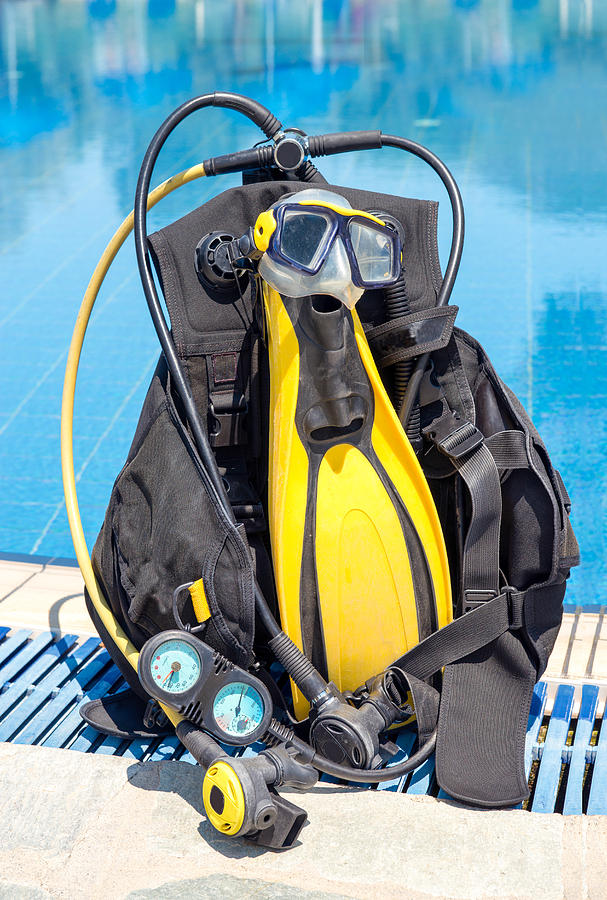Did You Know Scuba Gear Has Been Around Since 1942?
Take the Plunge: Dive into the Fascinating History of Scuba Gear, Dating Back to 1942!

Source fineartamerica.com
When Was Scuba Gear Invented?
The Early History of Diving
Diving is a practice that dates back centuries, with early examples of underwater exploration found in ancient civilizations such as Greece and Rome. However, it wasn't until the 16th century that diving began to become more sophisticated, with advances in diving bells and the development of diving suits allowing divers to safely explore deeper waters.The Need for Better Diving Gear
Despite these early advances in diving technology, diving remained a dangerous and challenging profession. Divers were limited by the amount of time they could spend underwater, and the need for surface-supplied air made it difficult to explore remote or inaccessible locations. As industrialization grew, the demand for underwater construction and salvage work increased, making it even more important to develop better diving gear.The Birth of Scuba
The term "scuba" stands for "self-contained underwater breathing apparatus," and the first scuba diving equipment was developed in the early 20th century. In 1907, two Frenchmen named Jacques-Yves Cousteau and Emile Gagnan began experimenting with a device that would allow divers to carry their own supply of compressed air underwater.Their invention, which they called the "aqua-lung," consisted of a compressed air tank that was attached to a regulator and mouthpiece. This allowed the diver to breathe normally underwater, without the need for a surface-supplied air source.The aqua-lung was first tested in 1943, during World War II, by a unit of French naval divers known as the "Groupe Autonome de Plongeurs." The success of this test led to further development of scuba gear, with improvements made to the design and function of the equipment over the following decades.Today, scuba diving is a popular recreational activity enjoyed by millions of people around the world. Modern scuba gear is designed to be safe, efficient, and user-friendly, with a wide range of equipment and accessories available to suit divers of all skill levels and interests.In conclusion, scuba gear was invented as a solution to the limitations of early diving equipment. The development of the aqua-lung in the early 20th century marked a major shift in the history of diving, allowing divers to explore the underwater world in a safer, more efficient way. Today, scuba gear continues to evolve, with new advances in technology making it easier than ever for people to experience the wonders of the deep.The Evolution of Scuba Gear
Scuba gear, an abbreviation for "Self-Contained Underwater Breathing Apparatus," has revolutionized the way that humans explore and interact with the underwater world. From the first rudimentary attempts in the 16th century to today's sophisticated equipment, the evolution of scuba gear has transformed the way we think about our relationship with the oceans. Here, we will take a closer look at the technological advancements and innovations that have propelled scuba gear into the modern era.
The First Scuba Equipment
Although the concept of scuba gear seems relatively modern, divers have been experimenting with early designs for hundreds of years. The first recorded attempt at a diving bell, a large, armored container with air pumped from the surface to enable breathing, dates back to 1535. In the 1600s, a Frenchman named Sieur Freminet developed a primitive diving suit, consisting of a leather jacket, helmet, and bagpipes for air supply. However, it wasn't until the mid-20th century that scuba gear as we know it today was invented.
Advancements in Scuba Gear
During the 1940s and 1950s, technological advancements made scuba diving safer and more accessible to the average person. In 1943, French naval officer Jacques-Yves Cousteau and French engineer Emile Gagnan invented the modern regulator system, which allowed divers to breathe underwater without a cumbersome air hose. This innovation paved the way for recreational diving and helped to popularize the sport. Over time, other safety features such as buoyancy control devices, depth gauges, and dive computers were also developed, making diving more efficient and comfortable.
Another major advancement in scuba gear is the development of dry suits, which allow divers to stay warm and dry in cold water. This type of suit is made from waterproof materials and encloses the entire body, creating an insulating layer of air between the skin and water. Additionally, the use of enriched air, or Nitrox, has become popular among divers in recent years. Nitrox is a mixture of nitrogen and oxygen that replaces some of the air in a divers' tanks, allowing them to stay underwater for longer periods.
The Future of Scuba Gear
As technology continues to advance, scuba gear is expected to become even more sophisticated and efficient. One potential innovation is the development of underwater propulsion systems, which could greatly increase a diver's mobility and reduce fatigue. These systems come in a variety of forms, from handheld propellers to full-body suits. Additionally, augmented reality technology could allow divers to interact with their surroundings in new ways, such as identifying different species of fish or highlighting points of interest on a wreck. Finally, innovations in rebreathers - scuba gear that recycles exhaled carbon dioxide - could make diving safer and more environmentally friendly by reducing the amount of gas that needs to be carried on a dive.
In conclusion, scuba gear has come a long way from its early beginnings to become one of the most exciting and accessible adventure sports in the world. Thanks to the innovative minds that continue to push the boundaries of what is possible, we can look forward to a future where exploring the world beneath the waves is safer, more comfortable, and more magical than ever before.




Post a Comment for "Did You Know Scuba Gear Has Been Around Since 1942?"